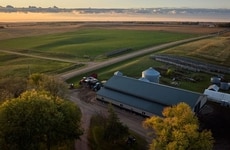20 Innovations Redefining the Carbon Impact of Food
Initiatives Driving a Lower-Emission Future
Jana Pijak — May 2, 2025



The global food system is one of the largest contributors to climate change, accounting for nearly one-third of global greenhouse gas emissions, with the carbon impact of food stemming from every stage of the supply chain—from the use of synthetic fertilizers and land-use change to energy-intensive processing, packaging, transportation, and the massive scale of food waste. As global demand for food continues to rise, so too does its carbon footprint. As awareness grows, a wave of innovations are beginning to reshape how food is produced and consumed, with a strong emphasis on transparency, efficiency, and environmental responsibility.
On the production side, several recent initiatives are focusing on reducing upstream emissions. Net Zero Farm Funds are enabling agricultural operations to invest in low-emission technologies, while regenerative agriculture partnerships are helping farmers rebuild soil health and sequester carbon. Simultaneously, low carbon fertilizer alliances are addressing one of the largest emission sources in modern farming by introducing more sustainable inputs.
Consumer-facing innovation is also accelerating. Tools like simplified carbon label menus, frozen food carbon labels, and carbon footprint packaging insights are helping individuals make informed dietary decisions based on environmental impact. This level of transparency is a powerful step toward reducing demand for high-emission products.
Product development is another area of transformation, with brands introducing climate-conscious alternatives such as upcycled high-protein shakes, low carbon food colorings, clean sugar innovations, and even sugar kelp-made beers. The food service industry is also adapting, with ethical veggie-forward restaurants and upcycled ingredient meal kits offering lower-impact culinary experiences.
Moreover, the issue of waste is being addressed through food waste awareness initiatives and food waste fuel programs, which help divert edible and organic material from landfills while repurposing it for energy.
Together, these advancements—including certified regenerative chocolates, climate-positive gins, and regenerative soybean gnocchi—illustrate the growing potential of a low-carbon food ecosystem. Understanding and supporting these developments is essential to reducing the climate impact of our food systems at scale.





































